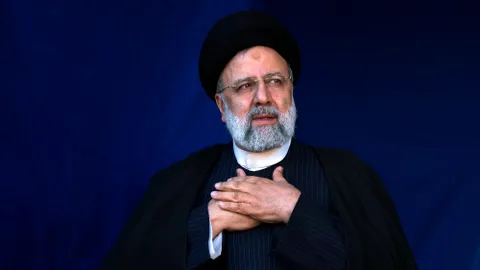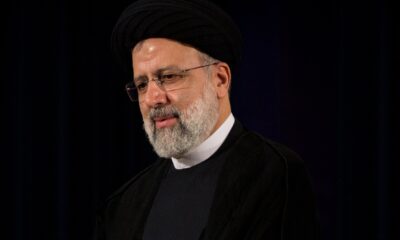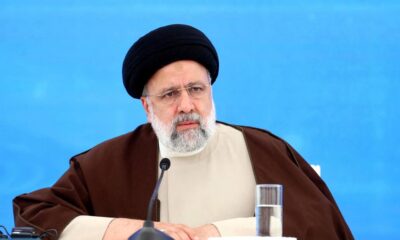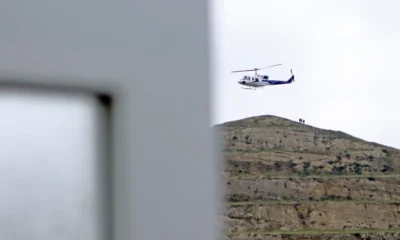News
Who Is Ebrahim Raisi, Iran’s President Whose Chopper Has Crashed And What Happens Next
Iran ultimately is run by its 85-year-old supreme leader, Ayatollah Ali Khamenei. But as president, Raisi supported the country’s enrichment of uranium up to near-weapons-grade levels, as well as it hampering international inspectors as part of its confrontation with the West.

Iran’s hard-line President Ebrahim Raisi has long been seen as a protégé to Iran’s supreme leader and a potential successor for his position within the country’s Shiite theocracy.
News of his helicopter making what state media described as a “hard landing” on Sunday immediately brought new attention to the leader, who already faces sanctions from the U.S. and other nations over his involvement in the mass execution of prisoners in 1988.
Raisi, 63, previously ran Iran’s judiciary. He ran unsuccessfully for president in 2017 against Hassan Rouhani, the relatively moderate cleric who as president reached Tehran’s 2015 nuclear deal with world powers.
In 2021, Raisi ran again in an election that saw all of his potentially prominent opponents barred for running under Iran’s vetting system. He swept nearly 62% of the 28.9 million votes, the lowest turnout by percentage in the Islamic Republic’s history. Millions stayed home and others voided ballots.
Raisi was defiant when asked at a news conference after his election about the 1988 executions, which saw sham retrials of political prisoners, militants and others that would become known as “death commissions” at the end of the bloody Iran-Iraq war.
After Iran’s then-Supreme Leader Ayatollah Ruhollah Khomeini accepted a U.N.-brokered cease-fire, members of the Iranian opposition group Mujahedeen-e-Khalq, heavily armed by Saddam Hussein, stormed across the Iranian border from Iraq in a surprise attack. Iran blunted their assault.
The trials began around that time, with defendants asked to identify themselves. Those who responded “mujahedeen” were sent to their deaths, while others were questioned about their willingness to “clear minefields for the army of the Islamic Republic,” according to a 1990 Amnesty International report. International rights groups estimate that as many as 5,000 people were executed. Raisi served on the commissions.
The U.S. Treasury in 2019 sanctioned Raisi “for his administrative oversight over the executions of individuals who were juveniles at the time of their crime and the torture and other cruel, inhuman, or degrading treatment or punishment of prisoners in Iran, including amputations.” It also mentioned his involvement in the 1988 executions.
Iran ultimately is run by its 85-year-old supreme leader, Ayatollah Ali Khamenei. But as president, Raisi supported the country’s enrichment of uranium up to near-weapons-grade levels, as well as it hampering international inspectors as part of its confrontation with the West.
Raisi also supported attacking Israel in a massive assault in April that saw over 300 drones and missiles fired at the country in response for a suspected Israeli attack that killed Iranian generals at the country’s embassy compound in Damascus, Syria — itself a widening of a yearslong shadow war between the two countries.
He also supported the country’s security services as they cracked down on all dissent, including in the aftermath of the 2022 death of Mahsa Amini and the nationwide protests that followed.
The monthslong security crackdown killed more than 500 people and saw over 22,000 detained. In March, a United Nations investigative panel found that Iran was responsible for the “physical violence” that led to Amini’s death after her arrest for not wearing a hijab, or headscarf, to the liking of authorities.
What happens if an Iranian president dies in office?
* According to article 131 of the Islamic Republic’s constitution, if a president dies in office the first vice president takes over, with the confirmation of the supreme leader, who has the final say in all matters of state.
* A council consisting of the first vice president, the speaker of parliament and the head of the judiciary must arrange a election for a new president within a maximum period of 50 days.
Raisi was elected president in 2021 and, under the current timetable, presidential elections are due to take place in 2025.
Kenya Insights allows guest blogging, if you want to be published on Kenya’s most authoritative and accurate blog, have an expose, news TIPS, story angles, human interest stories, drop us an email on [email protected] or via Telegram
-

 Grapevine2 weeks ago
Grapevine2 weeks agoAlleged Male Lover Claims His Life Is in Danger, Leaks Screenshots and Private Videos Linking SportPesa CEO Ronald Karauri
-

 Grapevine1 week ago
Grapevine1 week agoRussian Man’s Secret Sex Recordings Ignite Fury as Questions Mount Over Consent and Easy Pick-Ups in Nairobi
-

 Investigations5 days ago
Investigations5 days agoMulti-Million Dollar Fraud: Three Kenyans Face US Extradition in Massive Cybercrime Conspiracy
-

 Economy4 days ago
Economy4 days agoIran Demands Arrest, Prosecution Of Kenya’s Cup of Joe Director Director Over Sh2.6 Billion Tea Fraud
-

 Investigations2 weeks ago
Investigations2 weeks agoEpstein’s Girlfriend Ghislaine Maxwell Frequently Visited Kenya As Files Reveal Local Secret Links With The Underage Sex Trafficking Ring
-

 News3 days ago
News3 days agoTHE FIRM IN THE DOCK: How Kaplan and Stratton Became the Most Scrutinised Law Firm in Kenya
-

 Business4 days ago
Business4 days agoA Farm in Kenya’s Rift Valley Ignites a National Reckoning With Israeli Investment
-

 Business2 weeks ago
Business2 weeks agoM-Gas Pursues Carbon Credit Billions as Koko Networks Wreckage Exposes Market’s Dark Underbelly


























